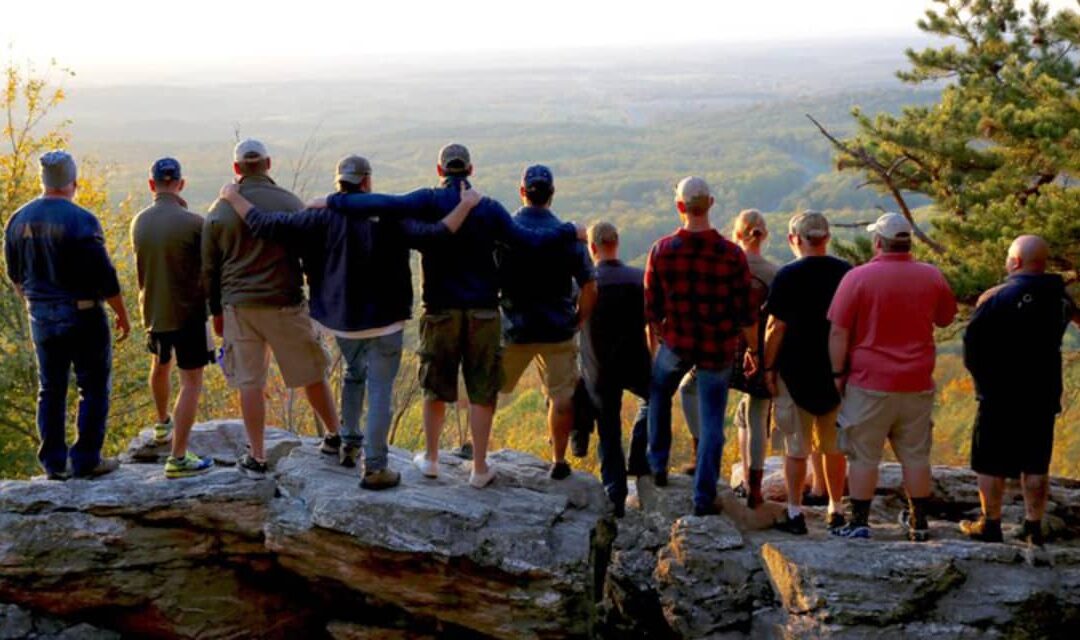When some people reach a certain age, they take their foot off the gas, lean back and begin enjoying the fruits of their lifelong labor. Certainly they’re entitled to do so.
But for others, taking it easy is the last thing they want to do. For them, the latter stages of a career can be the perfect time to give back. Some do so in a major way.
In 2010, Ken Falke, a 21-year Navy veteran, and his wife, Julia, began welcoming wounded service members into their home in Bluemont, Va. They knew that a steady stream of veterans were returning to the U.S. from Iraq and Afghanistan with terrible injuries — amputations, blindness, paralysis — and they wanted to help.
Ken Falke’s Boulder Crest Foundation helps first responders and their families as well as veterans.
Boulder Crest Foundation
Ken, now 61, is an entrepreneur who founded two for-profit and two nonprofit companies after leaving the Navy. The Falkes donated 37 acres of land and $1 million to launch the Boulder Crest Foundation, the nation’s first privately funded retreat for veterans and their families.
“We opened our doors in September 2013,” he tells Marketwatch. “We have helped 67,000 combat veterans, first responders and their families.”
A huge need
Impressive as that is, the need for assistance is far greater. These data points tell the story: Some 2.77 million U.S. service members served on 5.4 million deployments around the world between 2001 and 2018, according to a Rand Corp. analysis. Meanwhile, the U.S. Department of Veterans Affairs says that some 30% of veterans who were deployed during that time are suffering from post-traumatic stress disorder.
Tragically, PTSD has contributed to an epidemic of suicide. A 2021 study by Brown University estimated that that 30,177 veterans of post-9/11 conflicts had died by suicide. That is more than four times the number of personnel — 7,057 — who were killed in those conflicts.
“PTSD is also a huge issue with first responders,” Falke says, noting that “more police officers and firefighters die each year from suicide than they do in the line of duty.” The Boulder Crest Foundation helps first responders and their families too, he notes.
More support for mental health is needed
Such figures underpin Falke’s determination to raise awareness of the mental-health issues that affect far too many of our heroes. Their suffering is often hidden from view, and when veterans and first responders do seek treatment, they often find that the healthcare system is too cumbersome, too under-resourced or too focused on other things to respond in a truly effective way.
“The mental-health-care system in this country is broken,” Falke tells me. “It’s broken in the sense that it’s a system that’s driven by pharmaceutical companies and insurance companies, and at the association level, psychologists and psychiatrists, [by] poor leadership that has focused on traditional medicine. And mental health is not traditional medicine.”
He points out that mental-health issues have the potential to affect all of us — not just veterans who have seen combat or first responders who deal with traumatic issues on a regular basis, but everyone.
“Everybody, no matter who you are, is going to go through a series of ups and downs and experience various traumas,” he says. “Everything from your parents passing away to car accidents and all the things that happen in our lives.” Thus, he says, mental-health issues and their potential to impact everyone don’t get enough attention from the healthcare community.
Giving back is healthy
Helping at Falke’s level — donating a seven-figure sum and dozens of acres of land for a cause he believes in — is beyond most people’s ability. But the passion that burns within him to help others is all you really need in order to do good.
In fact, older Americans have this passion in a big way. Even though people over the age of 65 make up about one-sixth of the U.S. population — and their numbers are growing faster than the population as a whole — they account for more than 28% of all volunteer hours generated in America, according to Census Bureau data.
Aside from helping others, there’s yet another reason to volunteer in your community and make a difference: It’s healthy for you. VolunteerHub, which has helped organizations manage billions of volunteer hours for nearly three decades, says volunteer work can help strengthen your body, improve your mood and lessen your stress. It also cites research claiming that all else being equal, volunteers are as healthy as nonvolunteers who are five years younger.
That seems like a great two-for-one deal: Help others in your community while bolstering your own health and well-being at the same time. Perhaps this helps explain why so many older Americans who are able to do so give so generously of their time to help others.
You don’t need to be as wealthy as Ken Falke to help someone. You only need a desire and a willingness.
Where to start? I recommend VolunteerMatch.org. Just type in your zip code and it will generate a list of nearby opportunities. I’m sure one will speak to you.
Check out On Watch by MarketWatch, a weekly podcast about the financial news we’re all watching — and how that’s affecting the economy and your wallet. MarketWatch’s Jeremy Owens trains his eye on what’s driving markets and offers insights that will help you make more informed money decisions. Subscribe on Spotify and Apple.









